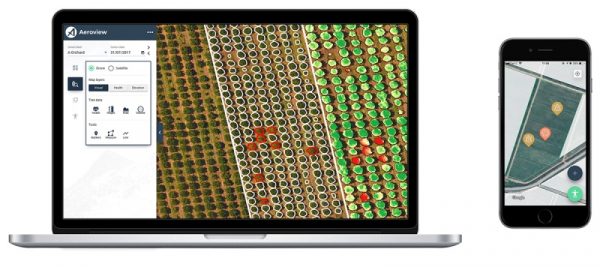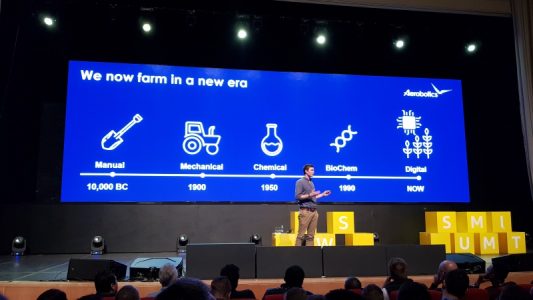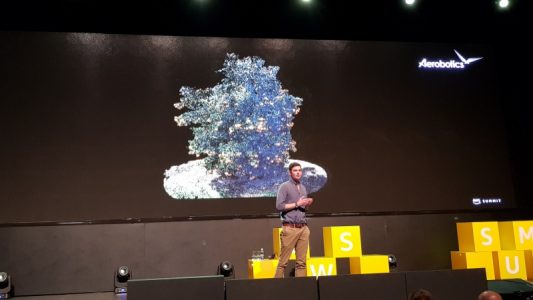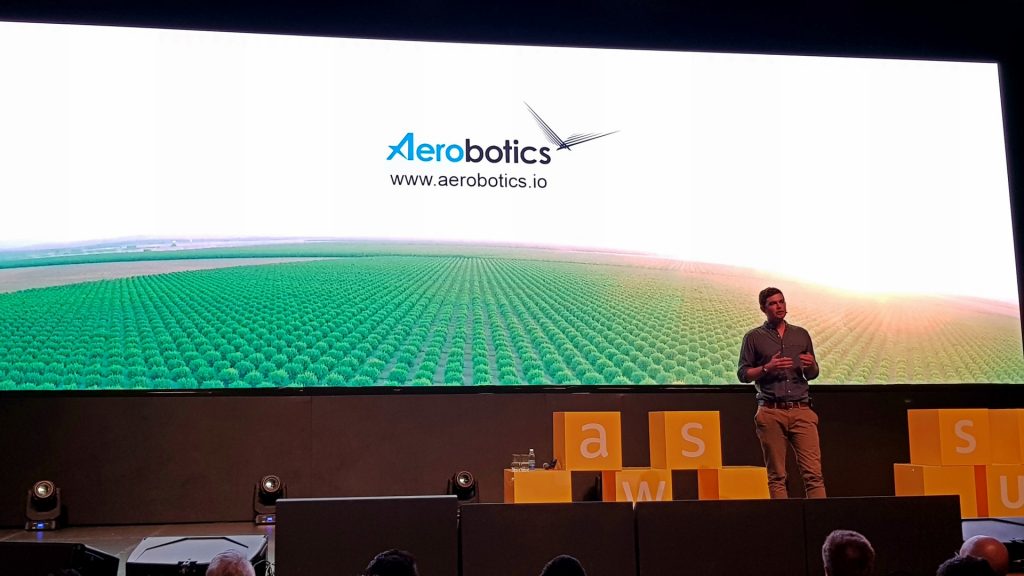Admittedly it’s been awhile since we last kept tabs on what local agri startup Aerobotics has been up to.
Last year we heard the Cape Town-based company had closed an R8 million round of funding in August, but we got to see how Aerobotics are leveraging drones and machine learning to help South African tree farmers at the AWS Summit Cape Town 2018 yesterday.
Filling us in on the technology they employ, the benefits it’s having on local agriculture, as well as what the next few months have in store was co-founder and CTO Benjamin Meltzer.

htxt.africa: It’s been awhile since we’ve heard from Aerobotics, what have you been up to for the past six months?
Benjamin Meltzer: The past six months has been a significant period of growth for us.
We spent some time in the States with the Google Launchpad accelerator program, which helped pushed some of our platform’s machine learning capabilities.
Our team has also nearly doubled in that time, with 32 people currently involved and based in Cape Town and five on the road across the country.
Another highlight has been the recent closure of our second round of funding about two days ago, but I can’t divulge all the finer details at this stage. That said there should be a formal announcement in the coming weeks.
htxt.africa: How many farmers is Aerobotics servicing locally at the moment?
Benjamin Meltzer: In South Africa there are roughly 450 farms on the platform.
htxt.africa: What types of farms are you currently assisting?
Benjamin Meltzer: Of all the farms we work on, about 95% of them are tree crop farms, with citrus and nuts being the primary focus.
htxt.africa: Being in the Cape, would vineyards be a consideration?
Benjamin Meltzer: That’s actually something we’re working on now. It’s also a type of tree I guess.
It is a little more difficult though, as your typical tree is lollipop shaped and you can view a lot of the canopy from above. Vineyards, however, are quite narrow which makes it a bit difficult to capture the relevant information from an aerial perspective.
It’s an issue that we’re starting to tackle now though.

htxt.africa: Does that mean that your current drones are unable to map these different types of farms?
Benjamin Meltzer: Well our existing drones have worked from quite high altitudes when we’re mapping from above, but as James [James Paterson, co-founder and CEO at Aerobotics] mentioned during the keynote, we’re starting to get much closer to the trees as we begin adding pest and disease analysis to our services.
htxt.africa: Sticking with drones, given how regulated the space is, does it effect your ability to operate?
Benjamin Meltzer: It does to some extent. I experienced a similar case when I worked at Uber, where the technology progressed so quickly that regulation isn’t able to keep up.
As a result regulatory bodies are either too loose or too tight with their policies. In the drone space it has been quite similar as different regions of the globe regulate the technology in different ways.
South Africa for example has been quite harsh, and as a result we no longer build or fly the drones ourselves.
Now we work through licensed drone suppliers, but getting a license is proving a real barrier at the moment, and we’re hoping the regulation starts opening up a bit over the next few years.
htxt.africa: When and how did AWS come into the picture for Aerobotics?
Benjamin Meltzer: We initially came across AWS’ technology through the Startupbotcamp in London, run by InsurTech. Through that we were able to get into the AWS Activate program, which was startup focused.
From there we were able to port over some of our systems to the AWS platform.
More recently, as AWS began to build its Cape Town infrastructure, we began to interact more significantly with the company, and moving even more of our services onto their products.
Given that we’re a cloud and machine learning focused business, AWS solutions help to form the core of our product.
htxt.africa: How is machine learning playing a vital role for your business?
Benjamin Meltzer: Our business serves as a good use case for machine learning, especially as it’s central to what we do.
Without it, our product would not offer nearly as much as it does.
The way we like to describe the process is that the drones collect imagery. We then use a level of machine learning to convert that imagery into data, such as finding individual trees in a farm. The next layer on top of that is turning that dat into insights and actionable insights at that.
With the power of machine learning, you’ve now got every tree on the farm feeding you information, which would normally be too difficult for a human to comprehend.
Thus machine learning is able to tap into what matters, taking gigabytes of data and transform it into three or four points for a farmer to better understand what’s happening to his crop.

htxt.africa: Your colleague mentioned that soon Aerobotics could do analysis on a leaf by leaf basis. Is that indeed a possibility?
Benjamin Meltzer: It’s definitely something that we’ll be able to do in the future.
We’re conducting a significant amount of trials on the process now, and we’re working through some technical aspects of it.
In an orchard you have on average 2 000 trees, which is already a lot to deal with, and as a result they have a massive number of leaves.
As such, the amount of data we consume is huge, but we’ve done a few trials and are getting some promising results in identifying specific problems on a leaf by leaf basis.
htxt.africa: What is the upshot of being able to do such in-depth analysis?
Benjamin Meltzer: Well currently we’re able to identify which trees in an orchard may have an illness, but we’re not able to accurately diagnose what the issue is.
This is somewhere that the farmer had to assist in making the assessment and help close the loop.
With a leaf by leaf analysis and through drones and automation, we can close that loop, and allow the farmer to tackle other issues they may have to deal with.
htxt.africa: Finally, looking forward, what’s on the cards for Aerobotics 12 months down the line?
Benjamin Meltzer: The hope is to have a larger global presence.
We have customers in other parts of the world like Spain, France and the UK, but the majority of our business is here in SA.
At the same time, we also aim to have a significant share of the South African market with this technology.

